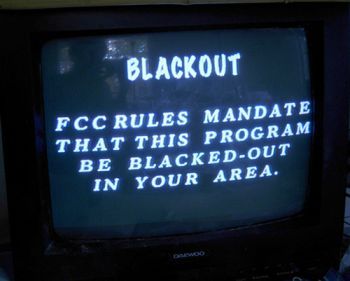
Publisher:
Bonnie King
CONTACT:
Newsroom@Salem-news.com
Advertising:
Adsales@Salem-news.com

~Truth~
~Justice~
~Peace~
TJP
Aug-02-2013 16:49

 TweetFollow @OregonNews
TweetFollow @OregonNews
Time for the FCC to Re-Examine Its Retransmission Consent Rules
Ralph E. Stone Salem-News.comThe July 29, 2013 deadline for reaching an agreement was extended until August 2.
 |
(SAN FRANCISCO) - Imagine not being able to watch "Person of Interest," "The Good Wife," "NCIS," and other programs on CBS or Showtime. But satellite customers like me as well as cable customers may not be able to have uninterrupted access to the major four (ABC, CBS, NBC, and Fox) because the 1992 Cable Act requires pay TV providers to get broadcaster consent to carry the station and, since there is no limit on what broadcasters can charge in retransmission fees, pay TV providers can either pay what is asked or lose access to these networks -- a black out.
"Retransmission consent," by the way, is a provision of the 1992 U.S. Cable Television Protection and Competition Act that requires cable operators and other multichannel video programming distributors to obtain permission from broadcasters before carrying their programming. In exchange, a broadcaster may propose that the operator pay cash to carry the station or ask for any other form of consideration. The cable operator, of course, may refuse the broadcaster's proposal and not carry the programming.
Presently CBS is in intense negotiations with Time Warner Cable (TWC), demanding $2 per month for each TWC customer its stations reach, about a 100 percent increase over the current contract. TWC has about 3.5 million customers, primarily in New York, Los Angeles, and Dallas. If an agreement is not reached, TWC customers will be unable to watch CBS programming. This may not be too important in the summer, the time for reruns, but with the football season starting in September, CBS' leverage increases.
The July 29, 2013 deadline for reaching an agreement was extended until August 2.
Broadcasters usually have the advantage in such negotiations because a cable system is prohibited by law from offering broadcast channels à la carte. It cannot just pay a broadcaster for just those subscribers that choose to get broadcast programming via cable or by satellite instead of over-the-air. All broadcast stations are entitled to be carried on the "basic tier," and all cable subscribers are required to buy the basic tier in addition to whatever other programming they want. What's more, local broadcasters have a legally-protected local monopoly on national content they might have nothing to do with creating. Broadcasters get protections beyond what could be enforced by contract. Thus, cable systems cannot try to strike a deal with anyone else.
According to American Television Alliance, a coalition of industry and public interest groups, retransmission fees have increased from $216 million to nearly $2.4 billion in just six years. Fees are estimated to more than double by 2018. Of course, these costs are passed on to consumers.
In addition, these same broadcast networks own most of the cable channels and link their carriage with broadcast channels, making it harder for new, independent networks to get their foot in the door. Nothing stops broadcasters from adding new cable channels, pushing out minority-owned or community-based channels.
The CBS/TWC negotiations raise a number of larger issues. That is, the state of the media and the communications marketplace. Why, for example, should cable or satellite systems have to pay for broadcast stations at all. These broadcasters are leveraging their government-granted monopolies to force cable and satellite systems to carry their properties.
Clearly, it is time for the Federal Communications Commission (FCC) to stand up to the intense lobbying by broadcasters who want to keep the status quo and adopt rules to protect consumers from rising fees and open up lineups for independent and minority-owned and community-based channels. After all the FCC has had an open proceeding to consider such rules since 2011.

Salem-News.com writer Ralph E. Stone was born in Massachusetts. He is a graduate of both Middlebury College and Suffolk Law School. We are very fortunate to have this writer's talents in this troubling world; Ralph has an eye for detail that others miss. As is the case with many Salem-News.com writers, Ralph is an American Veteran who served in war. Ralph served his nation after college as a U.S. Army officer during the Vietnam war. After Vietnam, he went on to have a career with the Federal Trade Commission as an Attorney specializing in Consumer and Antitrust Law. Over the years, Ralph has traveled extensively with his wife Judi, taking in data from all over the world, which today adds to his collective knowledge about extremely important subjects like the economy and taxation. You can send Ralph an email at this address stonere@earthlink.net
 |
 |
 |
Articles for August 1, 2013 | Articles for August 2, 2013 | Articles for August 3, 2013


googlec507860f6901db00.html


Salem-News.com:
Terms of Service | Privacy Policy
All comments and messages are approved by people and self promotional links or unacceptable comments are denied.
Ralph E. Stone August 3, 2013 7:27 am (Pacific time)
Because CBS failed to reach agreement with Time Warner Cable (TWC) by the deadline, TWC dropped CBS from its lineup in New York, Los Angeles, Dallas, and several other markets. We can expect similar blackouts as the big four networks negotiate future contracts with cable and satellite systems.
[Return to Top]©2025 Salem-News.com. All opinions expressed in this article are those of the author and do not necessarily reflect those of Salem-News.com.